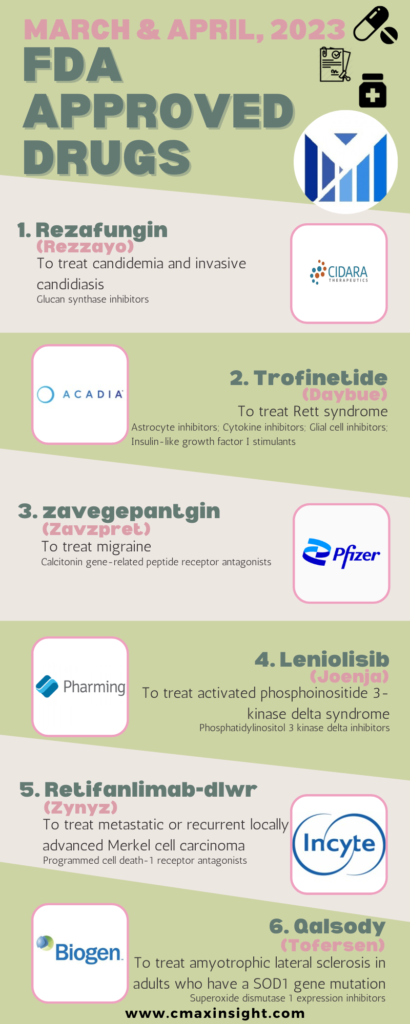Qalsody (tofersen)
Tofersen, an antisense oligonucleotide (ASO), is the first approved treatment for SOD1-ALS. In people with this form of the disease, mutations in their SOD1 gene cause their bodies to create a toxic form of SOD1 protein. This toxic protein causes motor neurons to degenerate, resulting in progressive muscle weakness. Tofersen is designed to bind to SOD1 mRNA and reduce SOD1 protein production.
In addition to the ongoing open label extension of the Phase III VALOR study, tofersen is being studied in the Phase 3 ATLAS study designed to evaluate whether tofersen can delay clinical onset when initiated in presymptomatic individuals with a SOD1 genetic mutation and biomarker evidence of disease activity. Biogen licensed tofersen from Ionis Pharmaceuticals, Inc. under a collaborative development and license agreement.
Joenja (leniolisib)
Joenja is the “first and only” oral, selective PI3Kδ inhibitor is the first and only treatment approved in the United States for APDS, a rare and progressive primary immunodeficiency. The FDA evaluated the Joenja application for APDS under Priority Review, which is granted to therapies that have the potential to provide significant improvements in the treatment, diagnosis or prevention of serious conditions.
Approval was based on findings from a multinational, triple-blind, placebo-controlled, randomized Phase II/III clinical trial, which evaluated efficacy and safety in 31 patients diagnosed with APDS aged 12 years and older. Also submitted as part of the application were data from a long-term, open-label extension clinical trial in which 38 patients received Joenja for a median of two years.
Rezzayo (rezafungin)
Rezzayo is an echinocandin antifungal indicated in patients who have limited or no alternative options for the treatment of candidemia and invasive candidiasis. Approval of this indication is based on limited clinical safety and efficacy data for Rezzayo. The FDA has approved Rezzayo as a once-weekly antifungal to treat invasive candidiasis and candidemia.
Last year, Melinta announced that it had acquired the exclusive rights to commercialize Rezzayo in the U.S. from Cidara. Cidara retains the rights to rezafungin in Japan and has licensed the commercial rights to Melinta Therapeutics in the U.S. and Mundipharma in all other geographies. The European Medicines Agency (EMA) accepted the marketing authorization application (MAA) for rezafungin in August 2022 and it is currently under review.
Zynyz (Retifanlimab-Dlwr)
Zynyz (retifanlimab-dlwr), a humanized monoclonal antibody targeting programmed death receptor-1 (PD-1), is FFDA approved for the treatment of adults with metastatic or recurrent locally advanced Merkel cell carcinoma (MCC). The Biologics License Application (BLA) for Zynyz for this indication has been approved under accelerated approval by the U.S. FDA based on tumor response rate and duration of response (DOR). Continued approval of Zynyz for this indication may be contingent on verification and description of clinical benefit in confirmatory trials.
The FDA approval was based on data from the POD1UM-201 trial, an open-label, multiregional, single-arm study that evaluated Zynyz in adults with metastatic or recurrent locally advanced MCC who had not received prior systemic therapy for their advanced disease. Among chemotherapy-naïve patients (n=65), Zynyz monotherapy resulted in an objective response rate (ORR) of 52% (95% confidence interval [CI]: 40-65) as determined by independent central review (ICR) using RECIST v1.1. Complete response was seen in 12 patients (18%), and 22 patients (34%) showed partial response. Among the responding patients, the duration of response (DOR) ranged from 1.1 to 24.9+ months, and 76% (26/34) experienced a DOR of six months or longer, and 62% (21/34) experienced a DOR of 12 months or longer by landmark analysis.
Daybue (trofinetide)
Daybue is the “first and only” FDA approved treatment for Rett syndrome in adults and children 2 years of age and older. Trofinetide is a synthetic version of a naturally occurring molecule known as the tripeptide glycine-proline-glutamate (GPE). The mechanism by which trofinetide exerts therapeutic effects in patients with Rett syndrome is unknown.
The FDA approval of DAYBUE was supported by results from the pivotal Phase 3 LAVENDER study evaluating the efficacy and safety of trofinetide versus placebo in 187 female patients with Rett syndrome five to 20 years of age. In the study, treatment with DAYBUE demonstrated statistically significant improvement compared to placebo on both co-primary efficacy endpoints, as measured by the change from baseline in Rett Syndrome Behaviour Questionnaire (RSBQ) total score (p=0.018) and the Clinical Global Impression-Improvement (CGI-I) scale score (p=0.003) at week 12.
In 2018, Acadia entered into an exclusive license agreement with Neuren Pharmaceuticals Limited for the development and commercialization of trofinetide for the treatment of Rett syndrome and other indications in North America.
Zavzpret (zavegepant)
Zavzpret, is the “first and only” calcitonin gene-related peptide receptor antagonist nasal spray for treating migraines with or without an aura, or sensory disturbances such as flashes of light that can accompany a migraine.
Zavzpret began working to treat migraine symptoms in as little as 30 minutes and provided some relief for up to 48 hours after the last administered dose. A 10mg dose of the drug proved more effective than a placebo at relieving pain and other migraine symptoms.
Approval was based on the pivotal Phase III study, Zavzpret was statistically superior to placebo on the co-primary endpoints of pain freedom and freedom from most bothersome symptom at two hours post-dose. The pivotal study also demonstrated pain relief as early as 15 minutes in a prespecified secondary endpoint versus placebo.


